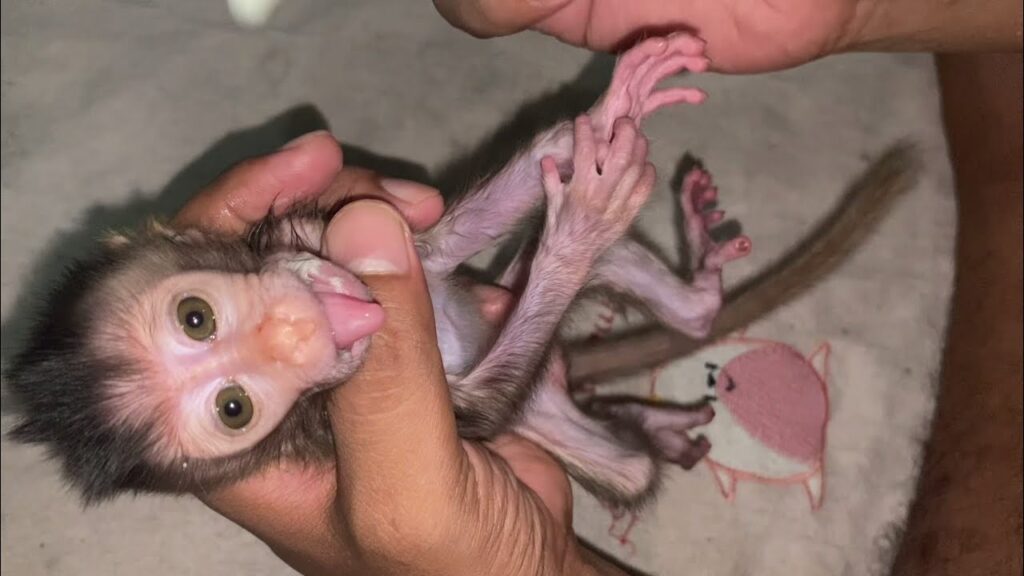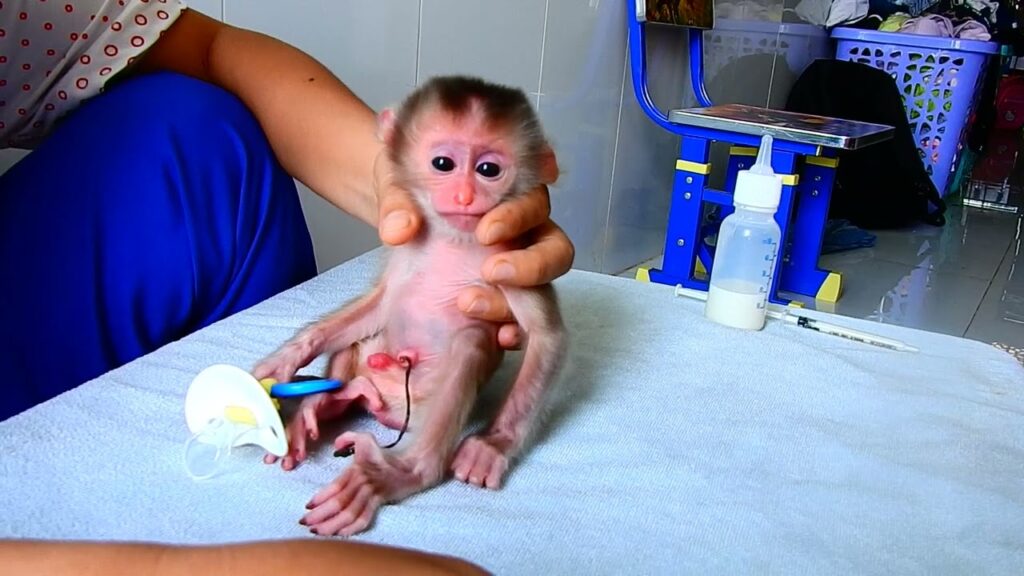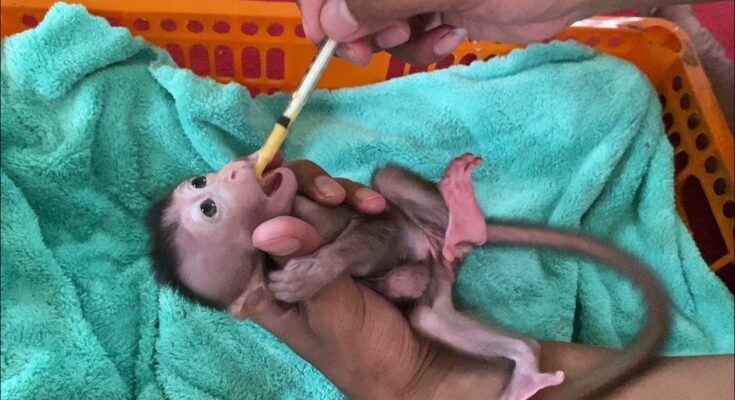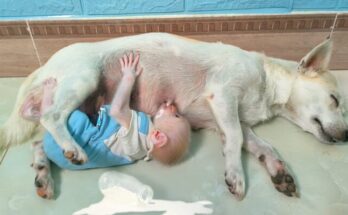In the heart of the dense rainforests or sprawling savannas, newborn monkeys are born into the world with the hope of a bright future. However, for some of these little creatures, that future is at risk from a variety of threats, such as poaching, habitat loss, and the destruction of their natural environments. When a poor baby monkey is orphaned or separated from its group, it is left vulnerable and in need of urgent help. In these circumstances, compassionate intervention and coordinated conservation efforts are essential to give these young primates a fighting chance for survival.
The Plight of Baby Monkeys
Monkeys, like all animals, are part of intricate ecosystems that depend on balance. For the young, life in the wild is filled with both wonder and peril. Baby monkeys depend on their mothers for warmth, nourishment, and protection during their early days. A mother monkey, typically very attentive, will care for her newborn by nursing, grooming, and teaching it the vital skills necessary for survival in the wild. However, in some heartbreaking cases, a baby monkey is separated from its mother due to natural disasters, illegal pet trade activities, or poaching.
When these young primates lose their mothers or are abandoned by their groups, their survival chances plummet. Alone and frightened, they are vulnerable to predators, malnutrition, and disease. In the wild, infant monkeys are highly dependent on their mothers for survival, both emotionally and physically. Without a caretaker, these babies may suffer immensely, unable to fend for themselves or even find food. Thus, it is essential to recognize that helping these babies isn’t just about feeding them; it’s about restoring their lost connection to their community, environment, and, above all, their identity as a wild animal.
The Role of Compassionate Intervention

The first step in rescuing a poor baby monkey is recognizing the need for intervention. In many cases, the baby monkey may have been abandoned, injured, or lost. It’s vital to assess the situation carefully and seek expert guidance. People who encounter a distressed baby monkey should avoid trying to care for it on their own without proper knowledge or training, as human intervention without proper expertise can often do more harm than good.
Reputable wildlife rescue organizations are equipped with the expertise needed to care for orphaned monkeys. These organizations have trained professionals who understand the delicate needs of primates and are equipped with the knowledge to provide proper medical treatment, nutrition, and psychological care. Without proper help, baby monkeys can suffer from dehydration, malnutrition, and stress, which could be fatal in the long run.
For instance, baby monkeys require a specific diet, typically consisting of formula milk suited to their age. Improper food or care could lead to gastrointestinal issues, which are common among orphaned animals. Furthermore, without socialization with their peers or older monkeys, these babies can become mentally and emotionally distressed, which could hinder their ability to integrate back into the wild.
Therefore, it’s essential to support wildlife sanctuaries and rescue organizations, which specialize in rehabilitating orphaned or injured monkeys. These sanctuaries often have experienced caregivers who mimic the social environment the monkeys would have experienced in the wild. They may introduce the baby to surrogate mothers or other young monkeys, allowing the infant to develop social skills, learn survival techniques, and regain trust in its own kind. As part of the rehabilitation process, these sanctuaries work toward the ultimate goal of returning the monkeys to their natural habitat once they have recovered sufficiently.
The Importance of Habitat Preservation
While caring for a poor baby monkey is an essential immediate response, we must also consider the larger picture—habitat loss. Many species of monkeys are currently facing the threat of extinction due to deforestation, mining, and agriculture expansion. The destruction of forests and jungles not only displaces these animals from their homes but also reduces their access to food and water sources. A poor baby monkey that has been orphaned due to habitat loss faces even greater odds of survival.
To prevent future cases of orphaned monkeys, it’s crucial to focus on preserving their natural habitats. Conservation efforts such as reforestation, sustainable land management, and creating protected areas can help mitigate the effects of habitat loss. By supporting these initiatives, we ensure that baby monkeys, along with many other species, can grow up in environments where they have access to the resources and safety they need to thrive.
One promising solution is the creation of wildlife corridors, which are pathways that connect fragmented areas of forest. These corridors enable monkeys and other wildlife to move between isolated habitats, helping them to find food, mates, and new territories. In this way, wildlife corridors provide a lifeline for baby monkeys and other creatures that may have lost their homes due to human activity.
Education and Advocacy for Conservation
Beyond direct intervention, raising awareness about the plight of baby monkeys is critical to their long-term survival. Education plays a key role in creating a sense of responsibility toward protecting wildlife. By fostering a greater understanding of the ecological importance of monkeys and other primates, people can take action to protect them.
Governments, NGOs, and local communities need to work together to spread awareness about the importance of protecting wildlife and their habitats. This includes supporting anti-poaching laws, promoting sustainable development practices, and engaging local communities in conservation efforts. In areas where monkeys and other primates are threatened by hunting or the illegal pet trade, it’s important to encourage alternatives to these destructive activities, such as eco-tourism or sustainable agriculture practices.
For individuals who are passionate about helping baby monkeys, volunteering with wildlife rescue organizations, donating to primate conservation efforts, or simply spreading awareness can have a meaningful impact. Every effort counts in ensuring that these vulnerable creatures have a fighting chance at survival.
The Hope for a Brighter Future

While the plight of a newborn poor baby monkey may seem bleak, the future doesn’t have to be without hope. Through collective compassion, concerted efforts in wildlife rescue, and strong conservation initiatives, we can help ensure that these young primates not only survive but thrive. Whether through direct intervention, supporting habitat preservation, or spreading awareness, each of us has a role to play in helping orphaned monkeys reclaim their place in the wild.
Ultimately, it’s not just about saving a single baby monkey—it’s about preserving entire ecosystems, ensuring that these creatures are able to fulfill their ecological roles, and giving future generations the chance to witness the beauty and wonder of these remarkable animals in their natural habitats. By acting with empathy, urgency, and a commitment to long-term solutions, we can help ensure that the world is a better place for all species, great and small.



